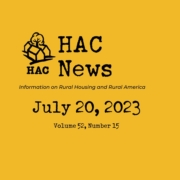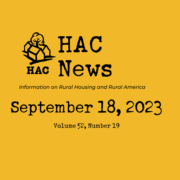Self-Help Housing Trainings from HAC’s Conference
Self-Help Housing
There are many potential homeowners who fall short financially but are able to contribute time and labor toward the construction or rehabilitation of their homes.
The self-help housing model helps bridge the gap in housing affordability by having participant families work together to build their homes. Instead of requiring a down payment, the prospective homeowners contribute their own labor to the project. When these families work together, they learn valuable construction skills and build a sense of community with their neighbors.
These five workshops, first recorded at HAC’s Virtual National Rural Housing Conference, provide an overview of the self-help housing process, how it works, and information on how local organizations can incorporate it into their efforts.
Introduction to USDA’s Mutual Self-Help Housing Program
This session provides an overview of USDA’s Mutual Self-Help Housing program. It covers funding possibilities, regulation requirements, and the grant application process, as well as eligible grant uses, program development, staffing needs, and feasibility.
USDA Self-Help Repair and Rehab Program
USDA-supported self-help housing rehab activities (acquisition/rehab and owner-occupied rehab) can be viable additions to affordable housing work. This session is designed for organizations currently active in the program as well, as those considering it. Workshop leaders share the latest instructions and guidance governing rehab activities and show before-and-after pictures of self-help projects. The discussion focuses on challenges, successes, and best practices in delivering the program. The audience was able to ask questions about the impacts of COVID. One of the presenters shares the key to the self-help method with a quote.
“Helping people help themselves benefits the participants and the community while making better use of scarce resources.”
Tips and Updates for Self-Help Housing Group Coordinators
In this session, experts present information on recent improvements to SHARES for group coordinators. Workshop leaders also provide an overview of how to use e-Forms for submitting Section 502 and 504 applications. A nonprofit marketing specialist provides strategies for how to use social media, email marketing, and design to share about your work with self-help programs. Self-help grantees are encouraged to share their updates on https://www.selfhelphousingspotlight.org/.
502 Loan Packaging: What’s New and What’s Challenging
Learn what’s new in Section 502 loan packaging and how to avoid common errors and omissions that cause delays in processing 502 loan applications. This session will help packagers improve the quality and completeness of applications to get faster loan closings for families.
5 challenges in 502 Packaging
- Significant Delinquencies, how credit worthiness impacts application processing and what can be done to streamline this step.
- How to account for full-time student income and student loan debt.
- COVID’s impact on calculating income and how to account for variations.
- What forms of verification are acceptable and what can a packager use to verify application details?
- What has COVID’s impact been on budgets and materials and how to best incorporate them into the loan process?
The Power of Leveraged Funds for Self-Help Housing
The coronavirus pandemic’s cost overages, material delays, and numerous other challenges have intensified the need for leveraged funds in self-help housing programs. Learn how leveraged funds can not only increase affordability and resources for applicants, but also build an organization’s capacity and control. Leveraging can also better position an organization for program diversification to address community needs.




